|
|
|
Sort Order |
|
|
|
Items / Page
|
|
|
|
|
|
|
| Srl | Item |
| 1 |
ID:
128298
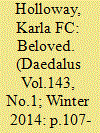

|
|
|
|
|
| Publication |
2014.
|
| Summary/Abstract |
When the music entered the window . . . both women heard it at the same time. . . . [W]here the yard met the road, they saw the rapt faces of thirty neighborhood women. Some had their eyes closed; others looked at the hot. cloudless sky. Sethe opened the door and reached for Beloved's hand. Together they stood in the doorway. For Sethe it was as though the Clearing had come to her with all its heat and simmering leaves, where the voices of women searched for the right combination, the key, the code, the sound that broke the back of words. Building voice upon voice until they found it, and when they did it was a wave of sound wide enough to sound deep water and knock the pods off chestnut trees. It broke over Sethe and she trembled like the baptized in its wash.
|
|
|
|
|
|
|
|
|
|
|
|
|
|
|
|
| 2 |
ID:
128297
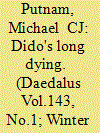

|
|
|
|
|
| Publication |
2014.
|
| Summary/Abstract |
...sic fata gradus evaserat altos, semianimemque sinu germanam amplexa fovebat cum gemitu atque atros siccabat veste cruores. illa gravis oculos conata attollere rursus de?cit; in?xum stridit sub pectore vulnus.
ter sesc attollcns cubitoquc adnixa levavit, ter revoluta toro est oculisque errantibus alto quacsivit caelo lucem ingemuitque repcrta. Tum luno omnipotens longum miserata dolorem dif?cilisque obitus lrim demisit Olympo quae luctantem animam nexosque resolvcret arms. nam quia nec fato merita nec morte peribat,
sed misera ante diem subitoque accensa furore, nondum illi flavum Proserpina vertice crinem abstulerat Stygioque caput damnaverat Orco. ergo Iris croceis per caelum roscida pennis millc trahcns varios advcrso sole colores devolat et supra caput astitit. 'hunc ego Diti sacrum iussa fero teque isto corpore solve': sic ait et dextra crinem secat. omnis et una dilapsus calor atque in ventos vita recessit.
|
|
|
|
|
|
|
|
|
|
|
|
|
|
|
|
| 3 |
ID:
128291
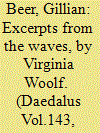

|
|
|
|
|
| Publication |
2014.
|
| Summary/Abstract |
Here is a hall where one pays money and goes in. where one hears music among somnolent people who have come here after lunch on a hot afternoon. We have eaten beef and pudding enough to live for a week without tasting food. Therefore we cluster like maggots on the back of something that will carry us on. Decorous, portly - we have white hair waved under our hats: slim shoes: little bags: clean-shaven cheeks: here and there a military moustache. not a speck of dust has been allowed to settle anywhere on our broadcloth. Swaying and opening programmes. with a few words of greeting to friends. we settle down. like walruses stranded on rocks. like heavy bodies incapable of waddling to the sea. hoping for a wave to lift us. but we are too heavy. and too much dry shingle lies between us and the sea. We lie gorged with food, torpid in the heat. Then. swollen but contained in slippery satin. the sea-green woman comes to our rescue. She sucks in her lips. assumes an air of intensity. in?ates herself and hurls herself precisely at the right moment as if she saw an apple and her voice was the arrow into the note. 'Ah !' "An axe has split a tree to the core: the core is
warm: sound quivers within the bark. 'Ab.' cried a woman to her lover, leaning from her window in Venice. 'Ah. Ah !' she cried. and again she cries 'Ah !' She has provided us with a cry. But only a cry. And what is a cry? Then the beetle-shaped men come with their violins: wait; count; nod; down come their bows. And there is ripple and laughter like the dance of olive trees and their myriad-tongued grey
|
|
|
|
|
|
|
|
|
|
|
|
|
|
|
|
| 4 |
ID:
128290
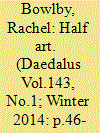

|
|
|
|
|
| Publication |
2014.
|
| Summary/Abstract |
In this piece. I look at an essay that l have probably read too often not to find in it the key to all matters
aesthetic, historical. philosophical, and more. The essay is Charles Baudelaire°s Le Peintre de la vie modeme (The Painter of Modern Life), first published in 1863 and written, most probably, around 1859 to 1860. Baudelaire's exhilarating innovation is to down- play the signi?cance of eternal value in art. in favor of what he designates as its other half, the ?eeting presentness that is modernity. My essay is unapologetically an appreciation - for the most part - of a text that, in focusing on another artist, itself appears to be just that.' For Baudelaire develops his arguments through a mock-anonymous celebration of the artist Constantine Guys, referred to as M. G. (Monsieur G.). Guys's proli?c sketches, done at speed, for rapid journal publication, chart the smallest of day-by- day changes and typical scenes in contemporary life. Guys's pictures - the art of modernity - give to the day a second life. and "translate" into a different medium - from sight to (mental) impression to its "rebirth" as a sketch - that which would otherwise be lost with its passing.
|
|
|
|
|
|
|
|
|
|
|
|
|
|
|
|
| 5 |
ID:
128299
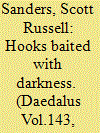

|
|
|
|
|
| Publication |
2014.
|
| Summary/Abstract |
I first read Walden when l was seventeen. the summer before starting college. at the urging of a high school teacher who sensed that my adolescent mind. brimming with questions, would bene?t from grappling with a truly radical thinker. Much of the book baf?ed me. The tone shifted unpredictably from conversational to prophetic, from jokey to stem, from earthy to mystical. I was bewildered by some of the lengthy sentences, which zigvagged among ideas and images. and l was stumped by the cryptic short ones. which seemed to compress whole paragraphs of meaning into a few words. Not yet having made any big decisions about how to lead my life, I couldn't ?gure out what was troubling this Henry David Thoreau. So what if his neighbors
thought he should use his Harvard degree to land a job and a wife, and then proceed to have kids, buy a
house. get rich. and distribute aims to the poor? Couldn't he just ignore the scolds and go his own way? Not yet having lost a loved one to accident. illness. or old age, I only dimly understood his brood- ing about that amoral process we call nature. So what if armies of red ants and black ants slaugh- tered one another, herons gobbled tadpoles, a dead horse stank up the woods, or a thousand seeds per- ished for each one that took root? What did all that mayhem and waste have to do with us, the owners of souls aiming at heaven ?
|
|
|
|
|
|
|
|
|
|
|
|
|
|
|
|
| 6 |
ID:
128294
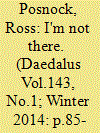

|
|
|
|
|
| Publication |
2014.
|
| Summary/Abstract |
Perhaps, like me. you have a propensity to collect books without quite knowing why. Over the years I have piled up books by and about, say, Ludwig Witt- genstein, Hannah Arendt, George Santayana, Philip Roth, Ad Reinhardt, Philip Guston, Franz Rosen- zweig, Penelope Fitzgerald, Thomas Bernhard - and not only not read them, but have no desire to do so. I have kept busy working on other things. And for a decade or two at a time. these texts simply gather dust on my shelves. But then, inevitably. I am drawn to these nearly forgotten volumes and. strangely, they prove pivotal to a new project: l recall. for instance, that Santayana ascended, literally, from the obscurity of a low shelf to earn a chapter in my book on William and Henry James. Wittgenstein made an analogous, if more circuitous, journey from the shadows, waiting untouched, until five years ago when I kept a long-held inner vow to read an- other languishing tome, one that had stared me down so often it had acquired an aura of intimidation: Stanley Cavell's The Claim of Reason: Wittgen-stein, Skeptirism, Morality and Tragedy. It was indeed intimidating. but also inspiring: that experience opened the door to more Cavell - and to deeper engagements with Emerson - and to Wittgenstein, who has joined the sage of Concord as a central ?gure in my current project on writers. artists. and philosophers who renounce their careers. The peculiarities of this manner of book buying - the absence of full consciousness and the long gap between acquisition and reading - puts me in mind
|
|
|
|
|
|
|
|
|
|
|
|
|
|
|
|
| 7 |
ID:
128287
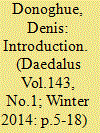

|
|
|
|
|
| Publication |
2014.
|
| Summary/Abstract |
It is a minor embarrassment that the words humanist and humanism are regularly found on the same page of big dictionaries. I should say at once, therefore, that the contributors to this issue of Dædalus are humanists because they work on the humanities and teach them, often under conditions that seem unpropitious, in colleges and universities. What they are otherwise, in their personal and social lives, is none of my business. Humanism raises a different issue. The Oxford English Dictionary gives ½ve meanings of it, in notably awkward phrasing. The predominant one refers to a tenet, an axiom, or a prejudice-depending on one's viewpoint-in the history of philosophy: A pragmatic system of thought introduced by F. C. S. Schiller and William James which emphasizes that man can only comprehend and investigate what is with the resources of the human mind, and discounts abstract theorizing; so, more generally, implying that technological advance must be guided by awareness of widely understood human needs. In some contexts, humanism has taken on
|
|
|
|
|
|
|
|
|
|
|
|
|
|
|
|
| 8 |
ID:
128295
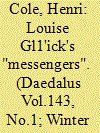

|
|
|
|
|
| Publication |
2014.
|
| Summary/Abstract |
You have only to wait, they will find you. The geese ?ying low over the marsh, glittering in black water. They find you. And the deer - how beautiful they are. as though their bodies did not impede them. Slowly they drift into the open through bronze panels of sunlight. Why would they stand so still if they were not waiting? Almost motionless, until their cages rust, the shrubs shiver in the wind. squat and lea?ess. You have only to let it happen: that cry - release, release - like the moon wrenched out of earth and rising full in its circle of arrows until they come before you like dead things. saddled with ?esh. and you above them. wounded and dominant.
|
|
|
|
|
|
|
|
|
|
|
|
|
|
|
|
| 9 |
ID:
128293
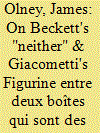

|
|
|
|
|
| Publication |
2014.
|
| Summary/Abstract |
I am very grateful to the editors of lkrdalm for per mitting and even encouraging me to select two works - Samuel Beckett's "neither" and Alberto Giacometti's sculpture Figurine entre deux boites qui
sont des maisons - for my discussion of influence. As I have been associated with literature departments throughout my career, I have chosen Beckett's for my primary text. But while I believe that what I want to say could be said from that work alone. I also believe that it will be more forceful, more convincing. and surely more graphic if I couple "neither" with Giacometti's Figurine. And as artists. Beckett and Giacometti had. in the ?nal analysis. so much in common that when we read. as a summary judgment of a whole body of work. that "he is one of the few artists who has contributed fundamentally to the way the human condition is perceived," no one unfamiliar with the statement could say with any assurance which artist is its subject.
|
|
|
|
|
|
|
|
|
|
|
|
|
|
|
|
| 10 |
ID:
128300
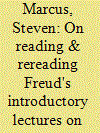

|
|
|
|
|
| Publication |
2014.
|
| Summary/Abstract |
I am going at least at first to write autobiographically. My justification for doing so is that I regard my experience as relatively typical and hence as bearing some fraction of non-negligible, if perhaps oblique, interest. I first read Freud sixty-?ve years ago. I was eighteen years old, and the occasion arose in what was then offered in my intellectually conservative college as a new course. The subject was in the humanities. and it consisted of works selected from some of the many masters of mid- nineteenth- and early-twentieth-century literature and thought. Included among them were such ?gures as Melville, Flaubert. Dostoevsky, Nietzsche. Henry and William James, George Bernard Shaw, I). H. Lawrence. Joyce, Proust, and Kafka. Inserted some- where in the second half of the chronological list was Freud's Introductory Lectures on Psychoanalysis, which he originally delivered between 1915 and 1917.' Hence the context in which Freud was pre- sented, and presented himself, to my largely bewildered late-adolescent sensibility was that of Western cultural, intellectual, and literary modernism. It was an advantage, I believe, to have read him for the first time among other immensely distinguished minds, writers who were in the course of radically departing from what had been generally accepted as canonical forms, conceptions, and conventions of representation - and of norms and values. including the values of civilization and of life itself.
|
|
|
|
|
|
|
|
|
|
|
|
|
|
|
|
| 11 |
ID:
128289
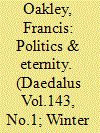

|
|
|
|
|
| Publication |
2014.
|
| Summary/Abstract |
The Leviathan is the greatest. Perhaps the sole. Masterpiece of political philosophy written in the English language. And the history of our civilization can provide only a few works of similar scope and achievement to set beside it. Consequently, it must be judged by none but the highest standards and must be considered only in the widest context. The masterpiece supplies a standard and a context for the second-rate. which indeed is but a gloss: but the context of the masterpiece itself. the setting in which its meaning is revealed. can in the nature of things be nothing narrower than the history of political philosophy.
|
|
|
|
|
|
|
|
|
|
|
|
|
|
|
|
| 12 |
ID:
128292
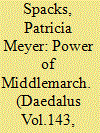

|
|
|
|
|
| Publication |
2014.
|
| Summary/Abstract |
Dorothea's eyes followed her husband anxiously. while he sank down wearily at the end of a sofa, and
resting his elbow supported his head and looked on the floor. A little flushed, and with bright eyes, she
seated herself beside him, and said "Forgive me for speaking so hastily to you this morning. I was wrong. I fear I hurt you and made the day more burdensome." "I am glad that you feel that, my dear," said Mr. Casaubon. He spoke quietly and bowed his head a little, but there was still an uneasy feeling in his eyes
as he looked at her. "But you do forgive me?" said Dorothea, with a quick sob. In her need for some manifestation of feeling she was ready to exaggerate her own fault. Would not love see returning penitence afar off , and fall on its neck and kiss it? "My dear Dorothea - 'who with repentance is not satis?ed. is not of heaven nor earth:'- you do not think me worthy to be banished by that severe sen- tence." said Mr. C asaubon. exerting himself to make a strong statement. and also to smile faintly. Dorothea was silent. but a tear which had come up with the sob would insist on falling. "You are excited, my dear. And I also am feeling some unpleasant consequences of too much mental disturbance." said Mr. Casaubon. In fact, he had it
in his thought to tell her that she ought not to have received young Ladislaw in his absence: but he abstained. partly from the sense that it would be un-gracious to bring a new complaint in the moment
|
|
|
|
|
|
|
|
|
|
|
|
|
|
|
|
| 13 |
ID:
128288
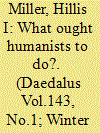

|
|
|
|
|
| Publication |
2014.
|
| Summary/Abstract |
I am honored to contribute to this issue of Dcedalus, "What Humanists Do."' Each contributor was asked by guest editor Denis Donoghue to identify a text that has meant much to her or him. then discuss it. This assignment presupposes that humanists spend much of their time interpreting texts and promoting their circulation among their students. readers of their scholarship, and the general public. It is as though we contributors were asked, "Come on now, account for your activities as humanists. Tell us what you do. Tell us why what humanists do contributes to the public good!" I promise further on to give such an accounting for my own work. First, however, I need to make a few preliminary remarks.
|
|
|
|
|
|
|
|
|
|
|
|
|
|
|
|
|
|
|
|
|